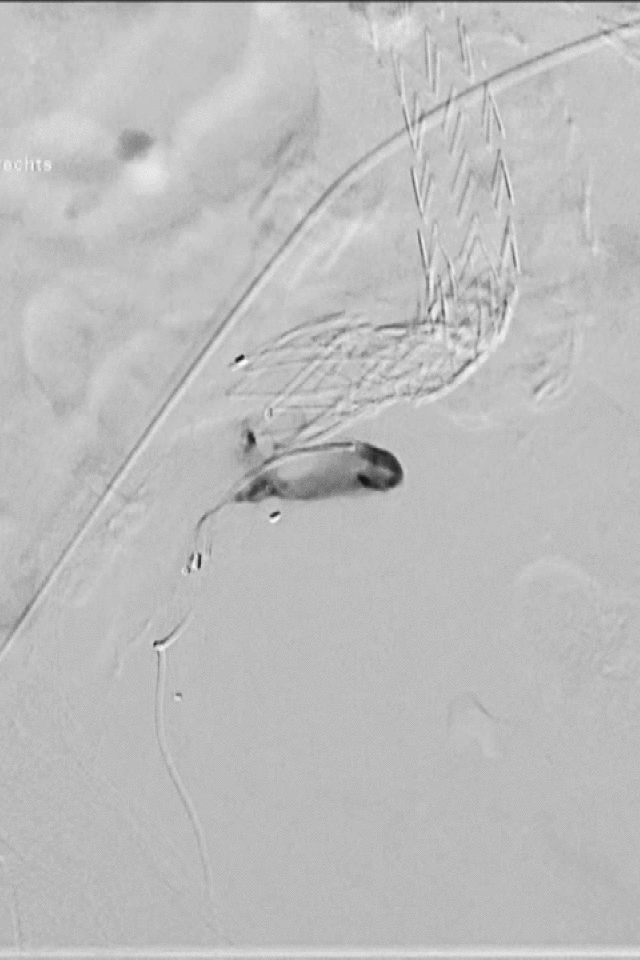A Complex retrograde transarterial access and embolization of a giant internal iliac artery aneurysm after occlusion failure of Micro vascular plug (MVP) embolization and preceding EVAR in the distal ectatic Aorta and bilateral iliac artery aneurysms
DOI:
https://doi.org/10.59667/sjoranm.v6i1.12Keywords:
Aneurysm, right internal iliac artery, complex embolization of 4 feeding vessels with Microcoils, Onyx after preceding unsuccessful Micro-vascular plug (MVP) implantations, EVAR in distal abdominal aorta and both iliac arteriesAbstract
The therapy of pelvic aneurysms is minimally invasive through interventional radiology using various devices and embolic agents: 1. By using a covered stent/prosthesis to maintain antegrade flow when a landing zone, i.e., a vascular segment angiographically present into which the stent can be placed to bridge the neck of the aneurysm, thereby interrupting aneurysm perfusion. 2. Through complete embolization of the aneurysm using embolic agents/coils. 3. As performed in our case, by covering the aneurysm (Img 14 A-C) with a covered stent /prosthesis, following prior embolization of the branching vessels using macroembolic agents.In cases where there is insufficient occlusion of the aneurysm with residual perfusion, secondary em- bolization becomes considerably more complex due to the occlusion of the anatomically antegrade access and the altered hemodynamics around the aneurysm causing retrograde collateralization.
Through detailed analysis of CT angiography, even in static CT, retrograde circulation could be iden- tified, allowing for a minimally invasive secondary approach to the aneurysm without the need for general anesthesia and/or surgery. By completely eliminating the aneurysm, the risk of rupture in the elderly patient was minimally invasively eliminated. The treatment of this patient exemplifies the possibilities that embolization with a wide array of embolic agents and catheters offers in a hemo- dynamically very complex situation.
References
Scheurig-Munkler C, Zerwes S. [Isolated iliac artery aneurysm : Clinical background and interventional treatment strategies]. Radiologie (Heidelb) 2022;62(7):607-613. DOI: 10.1007/s00117-022-01002-w.
Nzomvuama ANNs, Muanda GM, Fala JEM, Mukuna PM, Nsiala JM. Ruptured internal iliac artery aneurysm in Kinshasa, Democratic Republic of the Congo. Journal of Vascular Surgery Cases, Innovations and Techniques 2022;8(3):325-327. (https://www.ncbi.nlm.nih.gov/pmc/articles/PMC9259442/pdf/main.pdf).
Kim J, Chun JY, Ameli-Renani S, et al. Outcome of endovascular treatment of internal iliac artery aneurysms: a single center retrospective review. CVIR Endovasc 2022;5(1):53. (In eng). DOI: 10.1186/s42155-022-00330-1.
Khazi ZM, Marjara J, Nance M, et al. Gastroduodenal artery embolization for peptic ulcer hemorrhage refractory to endoscopic intervention: A single-center experience. Journal of Clinical Imaging Science 2022;12.
Perini P, Mariani E, Fanelli M, et al. Surgical and endovascular management of isolated internal iliac artery aneurysms: a systematic review and meta-analysis. Vascular and Endovascular Surgery 2021;55(3):254-264. (https://journals.sagepub.com/doi/10.1177/1538574420981812?url_ver=Z39.88-2003&rfr_id=ori:rid:crossref.org&rfr_dat=cr_pub%20%200pubmed).
Kang J, Chung B-H, Hyun D-H, Park Y-J, Kim D-I. Clinical outcomes after internal iliac artery embolization prior to endovascular aortic aneurysm repair. International Angiology: a Journal of the International Union of Angiology 2020;39(4):323-329.
Gao P, Dong D, Yang L, et al. Technical issues and clinical outcomes of endovascular repair of isolated iliac artery aneurysms: A single-center experience. Vascular 2018;26(6):591-599. (https://journals.sagepub.com/doi/10.1177/1708538118776854?url_ver=Z39.88-2003&rfr_id=ori:rid:crossref.org&rfr_dat=cr_pub%20%200pubmed).
Song KS, Lee H, Nam DH, et al. Use of reversed iliac leg stent-graft for the treatment of isolated aneurysm of internal iliac artery. Vascular Specialist International 2014;30(1):38. (https://www.ncbi.nlm.nih.gov/pmc/articles/PMC4480301/pdf/vsi-30-38.pdf).
Yao CA, Arnell TD. Hepatic artery pseudoaneurysm following laparoscopic cholecystectomy. Am J Surg 2010;199(1):e10-1. (In eng). DOI: 10.1016/j.amjsurg.2009.03.014.
Parthenis DG, Skevis K, Stathopoulos V, Bellenis I, Vassilakopoulos T. Postlaparoscopic iatrogenic pseudoaneurysms of the arteries of the peritoneal and retroperitoneal space: Case report and review of the literature. Surgical Laparoscopy Endoscopy & Percutaneous Techniques 2009;19(2):90-97.
Muller-Wille R, Herold T, Jung EM, et al. [Onyx (ethylene-vinyl-alcohol-copolymer)--a novel approach to the endovascular treatment of acute bleeding]. Rofo 2009;181(8):767-73. DOI: 10.1055/s-0028-1109446.
Dix F, Titi M, Al-Khaffaf H. The isolated internal iliac artery aneurysm—a review. European Journal of Vascular and Endovascular Surgery 2005;30(2):119-129. (https://www.ejves.com/article/S1078-5884(05)00256-X/pdf).
Parry DJ, Kessel D, Scott DJ. Simplifying the internal iliac artery aneurysm. Ann R Coll Surg Engl 2001;83(5):302-8. (https://www.ncbi.nlm.nih.gov/pubmed/11806552
https://www.ncbi.nlm.nih.gov/pmc/articles/PMC2503416/pdf/annrcse01633-0014.pdf).
Lacquet J, Lacroix H, Nevelsteen A, Suy R. Inflammatory abdominal aortic aneurysms. A retrospective study of 110 cases. Acta chirurgica Belgica 1997;97(6):286-292.

Downloads
Published
Issue
Section
License
Copyright (c) 2024 Nando Mertineit, Carlos Buitrago Tellez, Pascal Kissling, Frank Mosler, Johannes Heverhagen, Gerd Nöldge

This work is licensed under a Creative Commons Attribution 4.0 International License.
This license requires that reusers give credit to the creator. It allows reusers to distribute, remix, adapt, and build upon the material in any medium or format, even for commercial purposes.








